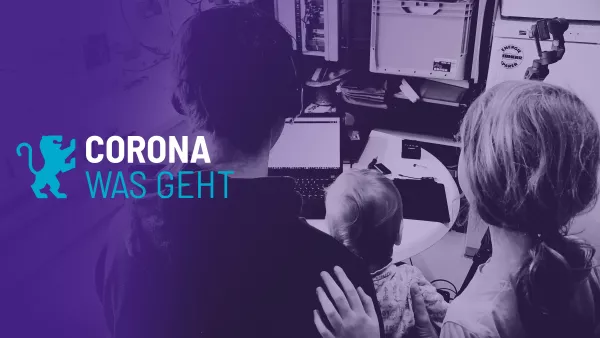
RWU does not stand still even in these extraordinary days and weeks. In many places new solutions are being worked on with commitment and creativity. With the series "Corona - What's up", we want to focus not only on what is currently not possible, but especially on what's up.
A professor in the exercise of his or her profession is imagined in a lecture hall with ascending rows of chairs. But the corona virus also takes a big bite out of this well-rehearsed scenario: start of the semester without lecture halls. What does that mean for the professors? An experience report from the home office of Professor Dr. Markus Pfeil:
I teach as a professor for embedded systems and I am the senate commissioner for sustainable development. At the same time, I have four children, three of whom are just completing the first stage (before the Easter holidays) in home school. My wife covers three types of school here at the same time, primary school, Waldorf school and grammar school. The tasks are very different, also the amount of work for the children. The very small one only gets very little time up-to-date. I myself prepare all my lectures by video and make them available online with assignments.
What becomes clear to me during this time is how important it is to make your everyday life sustainable. Sustainable in the social sense, even more so than in the ecological or economic sense. The economic sustainability is certainly also very important in uncertain times, but the social aspect shows up very clearly.
We have had to find a way of living together at home that we can maintain for weeks on end, in other words, that is sustainable. Here we found out that we were very used to the fact that the older children were either away from home or busy for a good part of the day, so there was time for many things without the children being around. I have found that the change from lecture and preparation to family is only successful if it includes a spatial separation that makes it clear when you work and when you are "at home", even if both take place at home.
Chance only favours the prepared mind.
The day needs a good structure, and that structure should only contain things that can be made sustainable. We do three hours of school every morning with a 30 minute break. My wife does that with the children. During this time I work (in the basement) and I am "not there". In the afternoon, my wife takes the children out into the fresh air, without friends, who were usually often present here. I continue to work then. We plan sports and TV times. At least for us this only works with a lot of structure, because then it works out that we do this every day and don't slide into a day without plan.
The attitude towards the crisis must also be sustainable, because it doesn't help to indulge in apocalyptic visions of doom, but neither does it help to cultivate an unreflected hope that everything will be all right. Both lead to inaction. Being attentive to my surroundings and always doing what I can do at the moment helps me at least a lot to deal with the situation permanently. Even if the digital teaching that I am doing at the moment might not be used in this form in the future, I have prepared something that is available to me now and in the future. This is also my appeal to the students: To learn what is possible now, because then you have a basis for what is coming, no matter what it looks like.
That's why my conclusion is that homeschooling is exhausting, because it's not always easy to implement the structure with children who are used to a lot of freedom and whose school structure is otherwise external. But it is feasible. And the home office is exhausting, because I have to give myself the structure, although it could be done differently. And yet I want to do it in such a way that I can maintain it sustainably.
And no matter what comes next, it will be easier for me to deal with it. Louis Pasteur said this aptly: Chance only favours the prepared mind.